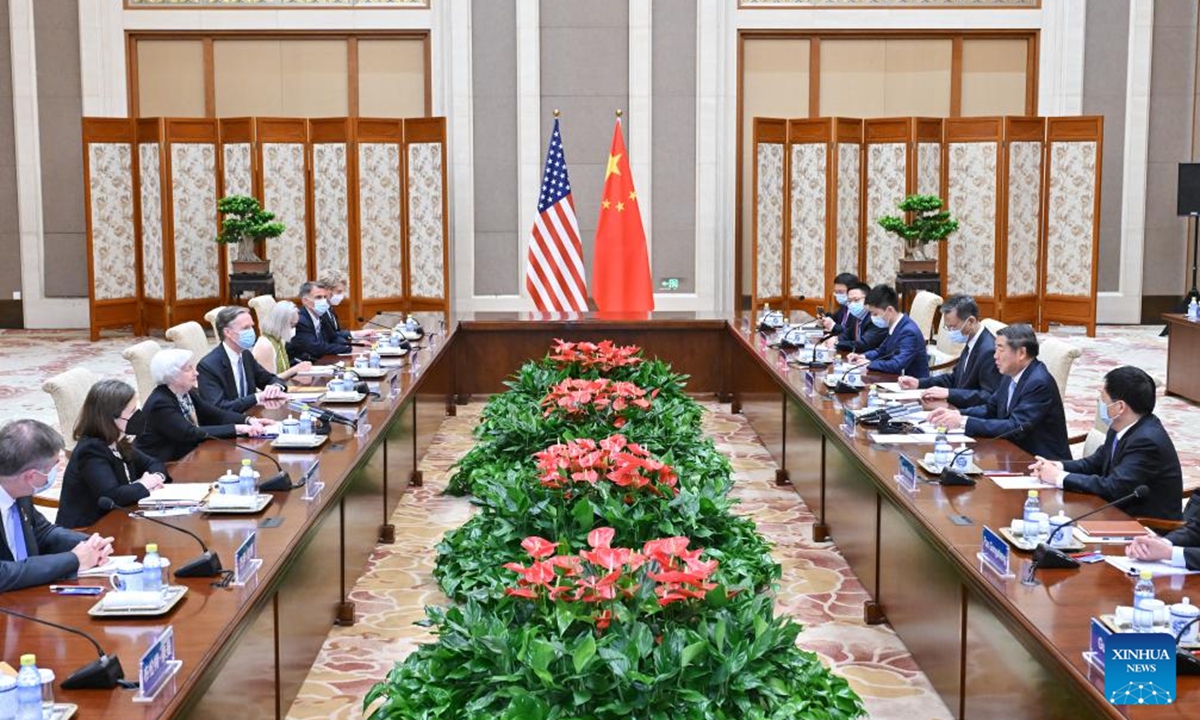
Chinese Vice Premier He Lifeng meets with U.S. Treasury Secretary Janet Yellen in Beijing, capital of China, July 8, 2023. (Xinhua/Yue Yuewei)
US Treasury Secretary Janet Yellen's visit to China ended on Sunday. During her trip, she and her team met with several senior Chinese government officials. According to the information disclosed by both sides, the talks focused on the economic and trade relations between the two countries and the global cooperation in the field. The Chinese side described the exchanges as "in-depth, candid and pragmatic" and the talks as "constructive", while the US side also used the words "candid, constructive and comprehensive." It should be said that the expressions of the two sides are similar, which may indicate more positive interactions between the two countries in the next step, and public opinion also generally regards it as a "positive step" for China and the US.
Amid the "frozen" US-China relations, the high-level interaction this time has displayed some new characteristics. Firstly, this trip lasted nearly four days, which is uncommon in recent years, reflecting that there are truly a lot of issues to be discussed between the two sides' economic and trade teams. Secondly, the exchanges between the two sides are dominated by a professional spirit. Judging from the expressions of the US side, this visit appears to have less ideological elements compared to previous years. The overall tone of the communication between the two sides is pragmatic, rational, and the atmosphere is relatively positive. Thirdly, both sides have demonstrated a shared willingness to implement the consensus reached by the heads of state, which is also the most crucial aspect.
We noted that Yellen had a number of positive statements during the visit. For example, she said at a press conference before concluding her visit that "The world is big enough for both of our countries to thrive," "President (Joe) Biden and I do not see the relationship between the US and China through the frame of great power conflict," and that China and the US should find a way to live together and share in global prosperity. She has repeatedly reiterated that the US is not seeking to decouple from China, and said that "it is possible to achieve an economic relationship that is mutually beneficial in the long term." These views should not be regarded as some kind of "polite phrases," because they reflect the voice and desire of the US business community represented by Yellen, which is a real existence in the US society and an inevitable presentation of the intertwined interests of China and the US.
These elements combined have given the outside world some positive expectations. However, such expectations are like a candle in the wind, weak and uncertain. To be frank, for the China-US relationship, the overall pessimistic outlook of the outside world remains unchanged. It is believed that Yellen's visit will hardly alter the trajectory of the economic relationship between the two countries, nor will it substantially improve the China-US relationship. People are more inclined to believe that Washington's policy direction toward China is still focused on containment and suppression, and there has been no change in the securitization of economic and trade issues by the US. This perspective is not only shared by the Chinese people but also widely held in the international community.
For instance, Yellen mentioned multiple times the US is seeking a healthy competition with China rather than a "winner-take-all" approach. While this may sound good, the key lies in how we define "healthy competition." Is it a US-style one in which the geopolitical appetite of the US is satisfied while China unconditionally cooperates? Or is it based on mutual respect, peaceful coexistence, and win-win cooperation? The root cause of the challenges in the China-US relationship lies in Washington's flawed perception of China. Unless the issue of the 'first button' is addressed, no matter how wonderful the ideas and wishes may be, they will remain nothing more than castles in the air.
Washington's actions in recent years have severely undermined outside world's confidence in the China-US relationship to the point where it is difficult to trust anything the US says. This can only be changed through concrete actions by Washington. "During her visit to China, Yellen once again mentioned the issue of "national security" and stated that the US would ensure that related measures would be "narrow in scope" and "highly targeted." However, whether it is the tariffs imposed by the US on China or the inclusion of Chinese entities on various control and sanction lists, what people see is only a serious securitization approach that appears to be in disarray. Even if the Biden administration makes an effort to rectify one or two of these mistakes, this could instill genuine confidence.
We value the positive message brought by Yellen, but we also recognize the difficulties in the China-US relationship. This communication between China and the US has provided impetus for restoring a constructive economic and trade relationship, as well as increased opportunities for stabilizing bilateral ties. However, to achieve a truly healthy China-US relationship, long-term joint efforts from both sides are necessary. Yellen is not only the US Treasury Secretary but also a professional scholar in the field of economics. We believe that her professional and pragmatic attitude to a certain extent represents the pursuit of a healthy China-US relationship by insightful individuals in the US. We welcome such a pursuit and hope that Yellen can bring back the insights gained in China to Washington, and from both the perspective of correcting understanding and taking pragmatic actions, contribute to the early restoration of the China-US relationship.




